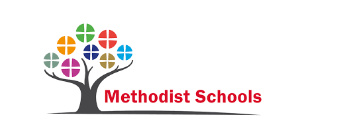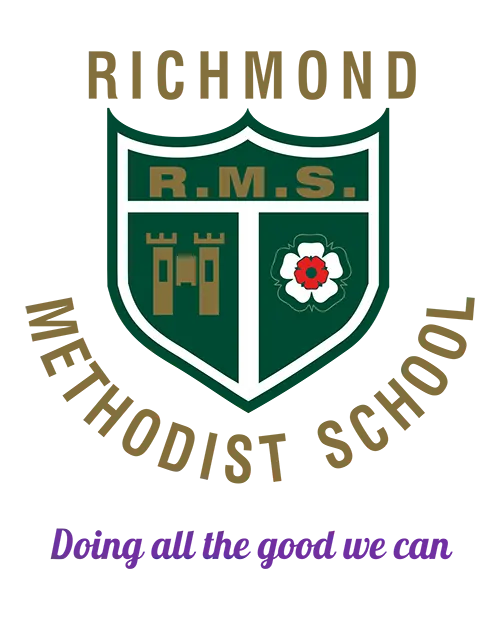
What does it mean to us to be a Methodist School?
Our school is ‘for all‘; those of faith and those with no faith.
We welcome ‘all’.
The Methodist Church was founded by John Wesley in the mid-1700s. He believed that Christianity and learning should be equal for all as all are equal. He travelled Britain, America and Europe teaching to assembled groups in the open air. Our school was founded by the Methodist Church in the mid-1800s and still today provides education for all and seeks equality for all.
Methodism traditionally shares a conviction that God has love for all people.
It teaches a belief in a triune of God – Father, Son, and Holy Spirit and faith in salvation through Jesus Christ. Methodism affirms the unity of all Christians in the Body of Christ.
We are proud to be a member of the Methodist school network that spans England and Wales.
As a Methodist Controlled school, the Christian faith underpins our learning and is one of the enablers for continuing the development of children’s spirituality but in no way does our ethos set out to convert.
At all times, we seek to find parallels with other faiths and beliefs.
Methodism within Christianity, provides our school vision which is centred within the Methodist belief and bible teachings; that all people are made in the image of God (Genesis 1:27); all people are of equal value/are equally loved by God (Galatians 3:28); and all people have a spiritual yearning however that is expressed, lived and articulated. (Psalm 63:1-5)
Within the Methodist tradition, this is lived out in our worship, our beliefs and our daily life. In our daily life we seek to follow advice attributed to John Wesley, the founder of Methodism:
“Do all the good you can, by all the means you can, in all the ways you can, in all the places you can, at all the times you can, to all the people you can, as long as ever you can.”
(1799 collection of sermons.)
At Richmond Methodist Primary and Nursery School, we know we are all welcome; willing to learn and receive; to reflect and respond; to deepen and develop and thereby to flourish.
Jesus teaches Christians to:
“Love the Lord your God with all your heart, soul mind and strength… and love your neighbour as yourself.”
(Mark 12:30-31)
Jesus calls Christians to focus upwards – towards God. Then outwards to serving others. Finally, he wants Christians to reflect inwards, in their own hearts, so they can know how to be the best possible version of themselves.
We present this transformational model as a window to look out, a mirror to reflect inwards and a door leading towards transformation.
This is the core ethos of our Richmond Methodist Primary and Nursery School ‘family’ and is omnipresent in every conversation or choice we make as members of our school community.
We encourage all to take part in our Collective Worship; to consider what this means to them, and what it may look like in their interactions as they navigate each day.
We believe that doing ‘all the good you can’ at all times and to all people, is best for the flourishing of both individuals and all of our communities.
We believe that worship and reflection, together, are an essential part of a life “lived in all its fullness” (John 10:10); and we also believe it is intrinsic to a harmonious community. We provide daily opportunities for children to be in the moment for self-reflection, to take stock of their spiritual development and take time to notice their environments. Our collective worship is guided by these core principles.
As a school, we celebrate that Christian values are not exclusive to Christianity and are valued by the wider community as they provide a moral compass for all. This is the basis for our citizenship curriculum.
Our Collective Worship is organised to enable the exploration and reflection of the values listed below. They are taken from the teachings of Jesus and are by no means exhaustive. Through these and our Religious Education, we teach children to ask and take time to reflect upon the really big questions they may have, some of which may not have an answer!
| Year A | Generosity | Compassion | Courage | Forgiveness | Friendship | Respect |
|---|---|---|---|---|---|---|
| Year B | Thankfulness | Trust | Perseverance | Justice | Service | Truthfulness |
Please select a link below to explore further.
Our School Values: ideas for family discussion and reflection.
Compassion (Luke 10:29.37)
Courage (1 Samuel 17)
Creativity (Psalm 148)
Forgiveness (Luke 19:2.10)
Friendship (Mark 2:1.12)
Generosity ((Mark 12:41.44)
Hope (Genesis 6:1.9.17)
Humility (8:5.13)
Justice (Book of Jonah)
Peace ((1 Samuel 24)
Perseverance (Luke 18:1.8)
Respect (Exodus 3.4)
Responsibility (Matthew 25:14.30)
Service (Book of Esther)
Thankfulness (Luke 17:11.19)
Trust (Mark 4:35.41)
Truthfulness (Luke 5:1.11, Luke 22:54.62, John 21:15.19)
Wisdom (Matthew 7:24.27)
Spirituality at Richmond Methodist Primary and Nursery School
Spirituality has been described as that which makes us conscious of the mystery and wonder of life and moves us to seek meaning in it. It recognises there is more to life than what we see and touch. Different things may prompt it.
We aim to provide as many opportunities as we can for children to experience and reflect in awe and wonder at the wonderful and mysterious world around them.
Here at Richmond Methodist Primary and Nursery School, we focus on the Spiritual Dimension; including the meaning of life, but also what makes life worth living, what is important to a person and what is hope and purpose. Our Spirituality centres on our relationships to one another, ourselves and the wider community. For all Christians, including Methodists, the source of all life and being is God revealed in Jesus Christ. Christian Spirituality is how people of the Methodist faith experience being drawn into the life and activity of God by his Spirit. It involves Prayer and study of the Bible but is much more. It is about the whole of life.
A Statement of Entitlement for Religious Education in our Methodist School
We believe all are entitled to be loved; infinitely, wholly and without condition.
This is at the heart of our Methodist School ethos.
As the adults in RMS, we surround the children, and each other in the absolute love that Jesus defined as God’s love ‘for all’. It is given to each and every member of our RMS family freely and is not dependent on the recipient. It does not expect a reward, rather it flows without question.
We do not define our RMS family love as a feeling; it is evident in our thoughts, actions or deeds. It is in part, the Holy Spirit.
In Galatians 5, we’re told that love is the fruit of the Spirit. It is only by the power of the Holy Spirit that we are able to love others as God has loved us. In turn, we encourage our children to show the same love to each other and to go forward into the world with an abundance of love to share. In this way they will flourish.
“Love suffers long and is kind; love does not envy; love does not parade itself, is not puffed up; does not behave rudely, does not seek its own, is not provoked, thinks no evil; does not rejoice in iniquity, but rejoices in the truth; bears all things, believes all things, hopes all things, endures all things.”
(1 Corinthians 13:4-7)
In the Bible, this love ‘for all’ is defined as ‘agape’ love. Methodists are taught that a life lived with infinite love, will be a life:
“Doing all the good you can, by all the means you can, in all the ways you can, in all the places you can, at all the times you can, to all the people you can, as long as ever you can.”
We follow the North Yorkshire Agreed Syllabus for our Religious Education. We aim to teach broad and balanced knowledge and understanding around our wonderfully diverse society but create deeper knowledge and cognition in the areas crucial to our RMS children’s development. We have a question-based approach within our class termly overviews. We aim to represent contrasting perspectives to enable our children to have an informed appreciation of their wider communities. In other words, to ‘love’ their neighbour and live in harmony. We also encourage children to use this knowledge to develop and refine their own sense of ‘spiritual self’.
In line with the law, Christianity comprises over 50% of our study time. Christianity is taught on a theological and conceptual basis, taking Christian accounts of the ‘big story’ of salvation and facilitating the relationship of our children to the Bible.
Our intent is to provide children with a core knowledge of ‘building blocks’ in relation to Christianity, through a Methodist lens. We use Methodist Units from the Methodist Resource. These Christian building blocks relate to other faiths and beliefs too, and parallels are made where possible.
The blocks build sequentially in small steps through each year and progress vertically through school, from EYFS to Year 6. We have a clearly defined curriculum where we plan carefully what children should know, understand and be able to do so they are able to ‘do all the good they can’, ‘for all’.
